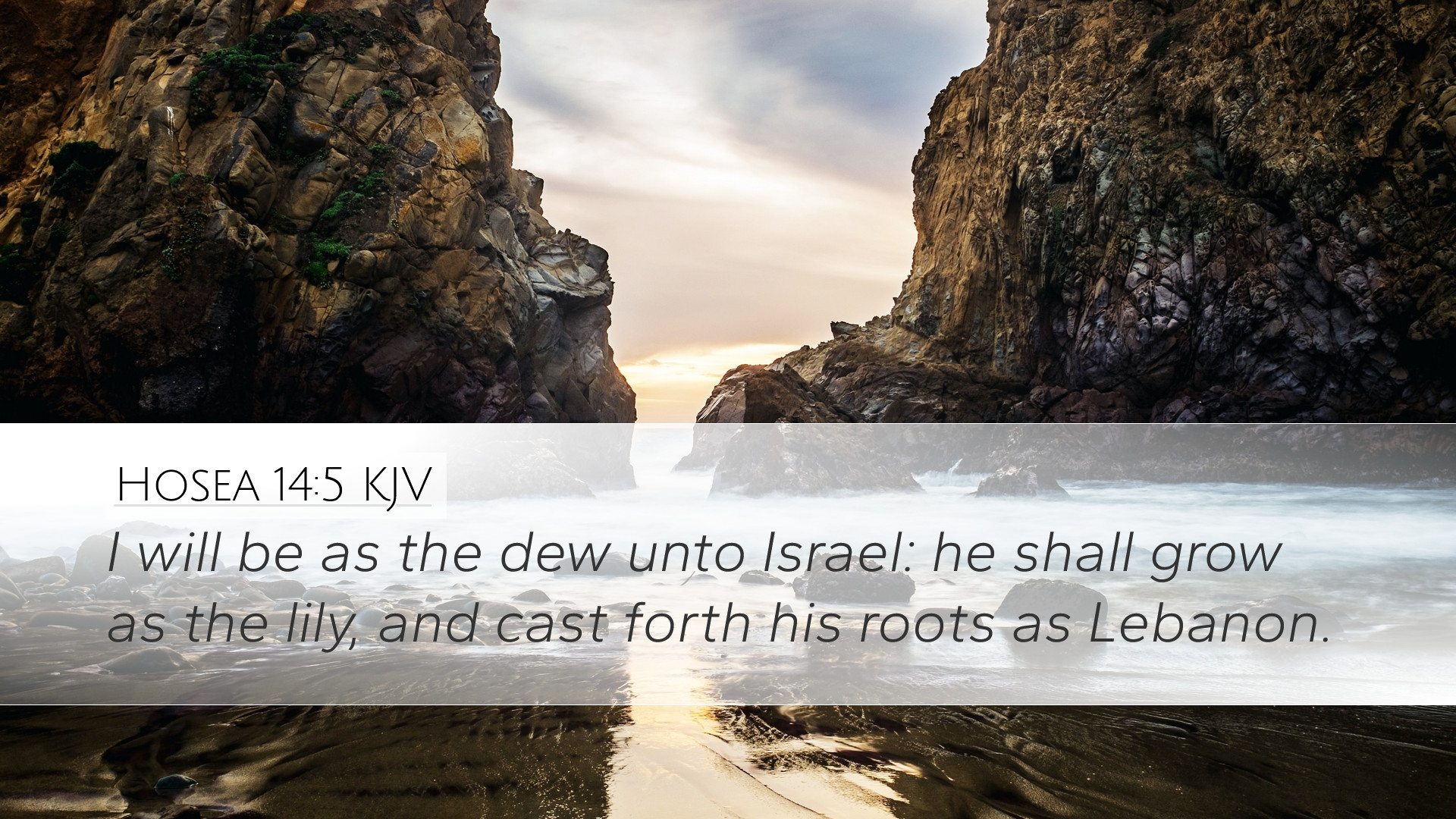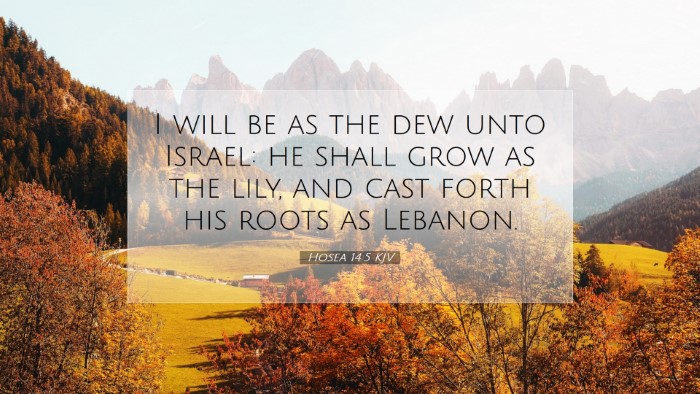Old Testament
Genesis Exodus Leviticus Numbers Deuteronomy Joshua Judges Ruth 1 Samuel 2 Samuel 1 Kings 2 Kings 1 Chronicles 2 Chronicles Ezra Nehemiah Esther Job Psalms Proverbs Ecclesiastes Song of Solomon Isaiah Jeremiah Lamentations Ezekiel Daniel Hosea Joel Amos Obadiah Jonah Micah Nahum Habakkuk Zephaniah Haggai Zechariah MalachiHosea 14:5
Hosea 14:5 KJV
I will be as the dew unto Israel: he shall grow as the lily, and cast forth his roots as Lebanon.
Hosea 14:5 Bible Commentary
Commentary on Hosea 14:5
Verse: "I will be as the dew unto Israel: he shall grow as the lily, and cast forth his roots as Lebanon." (Hosea 14:5)
Introduction
This verse presents a promise of restoration and growth, focusing on the character of God as a nurturing force for His people. The imagery of dew, lilies, and the cedars of Lebanon serves to convey richness in spiritual life, fertility, and strength that God intends for Israel. This commentary draws insights from several public domain sources, aiming to deepen our understanding of this beautiful text.
Commentary Insights
1. The Symbolism of Dew
Matthew Henry: Henry notes that dew signifies God's grace and blessings, which are refreshing and life-giving. Just as dew falls quietly and gently in the early morning, God's blessings often come in subtle yet profound ways. Dew nourishes the earth without overwhelming it, symbolizing the nurturing aspect of divine love.
Adam Clarke: Clarke elaborates that to be compared to dew indicates a divine influence that promotes life and health. This should encourage believers to think of God's sustaining presence that is always there, often unnoticed but constantly effective.
2. Growth As the Lily
Albert Barnes: In his exposition, Barnes highlights the beauty and simplicity of the lily, which flourishes through divine provision. The lily’s growth embodies purity, grace, and transient beauty, reminding believers of the fleeting nature of earthly life but also of the divine provision that allows them to bloom.
Matthew Henry: He parallels the metaphor of the lily to the life of the faithful, suggesting that just like lilies flourish in suitable conditions, so do God’s people thrive under His grace. The promise here speaks to spiritual beauty that results from divine nurture.
3. Roots as Lebanon
Matthew Henry: The reference to Lebanon emphasizes strength and stability. The cedars of Lebanon are renowned for their grandeur and resilience, historically symbolizing power and permanence. This imagery implies that as God's people return to Him, they will not only be nourished but deeply rooted in righteousness and faithfulness.
Albert Barnes: Barnes notes that the roots symbolize the deepening of one’s relationship with God, suggesting that spiritual growth leads to a strong foundation that withstands worldly trials. The image encourages an understanding of faith as not merely surface-level but anchored deeply in God.
4. Theological Implications
Adam Clarke: Clarke points out that God’s promise to Israel is multi-dimensional, addressing both physical sustenance and spiritual revival. The verse implies a holistic restoration of God’s people, promising that returning to God brings renewal in every aspect of life.
Matthew Henry: He emphasizes the importance of repentance and returning to God as a prerequisite for experiencing these blessings. It indicates that divine restoration comes with a condition of turning away from sin and embracing righteousness.
5. Application for Today
Albert Barnes: In reflecting on the application of this verse to the contemporary reader, Barnes asserts that believers today can take comfort in God’s unwavering support and nurturing care. Just as the Israelites received a promise of restoration, Christians are reminded that God’s grace sustains them amid life's challenges.
Matthew Henry: Henry encourages believers to be aware of God’s daily blessings and to cultivate a life that seeks His nurturing presence. He urges the faithful to embrace humility and dependence on God, much like plants rely on dew for life.
6. Conclusion
The verse embodies profound truths about God’s character and His relationship with humanity, particularly His people. The imagery of dew, lilies, and rooted trees paints a picture of a loving God who desires flourishing and stability for His creation. For pastors, students, theologians, and scholars, understanding these symbols enriches the theological landscape, providing a framework for interpreting God's abiding care and the call to repentance and renewal.


